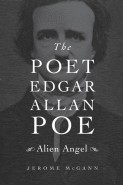
Book Review: The Poet Edgar Allan Poe: Alien Angel by Jerome McGann

The Poet Edgar Allan Poe: Alien Angel
Nonfiction by Jerome McGann
Harvard UP, October 2014
ISBN-13: 978-0674416666
$24.95; 256 pp.
Reviewed by Ryan Boyd
A new study of Edgar Allan Poe’s verse probably will not get most readers quivering, but such a book is needed. Poe’s poetry is routinely denigrated by scholars and ignored by readers, somewhat unfairly, as though it could not possibly compare to the man’s classic short stories. Jerome McGann’s monograph The Poet Edgar Allan Poe (Harvard, 2014, 256 pp.) wants to change that reputation. Aiming to bring Poe’s American status in line with the acclaim he has long gotten in France, the book makes bold assertions, such as that besides anticipating the aesthetic theory and practice of Baudelaire, Pater, and Swinburne, among others, his lyrics are a muted strain of political commitment. Further, in McGann’s view Poe’s preference for short lines and clipped rhymes is comparable to Dickinson’s strange meters, while other poems shaped modernist prose poetry, such as Rimbaud’s. McGann is in good company here: T.S. Eliot, William Carlos Williams, and Whitman all admired Poe, with Eliot venturing to call him as important as Wordsworth and Coleridge. (To be fair, though, Emerson and Ivor Winters detested him.) Besides the poetry, McGann makes extensive use of Poe’s theoretical writings and notebook marginalia.
Calling his method “philological,” McGann undertakes granular—sometimes to the point of tedium, long after a point is assured—readings, exactly what decent, old-school poetry criticism must do. He does not spend much time in the bogs of academic scholarship, for which readers will thank him. The book acknowledges and exploits the range of scholarship in American literary studies, a field in which McGann is a heavyweight, but it mostly keeps this in the endnotes. Poe’s writing is central.
So who was the poet Edgar Allan Poe, alien angel? As McGann has it, the main subject of his work is always poetics itself, as Poe believed that the art “is not adequately conceivable except as a poetic execution” (34). His theory was anti-didactic and held poetry to a musical aesthetic. In this he anticipates Walter Pater’s The Renaissance (1873). Working via what McGann calls “provocative indirection” (8) and “perpetually decentered reflection” (61), Poe’s lyrics can only be understood “through affective rather than cognitive channels” (81). When I read that his work is visually acute even though it also “unhinge[s]” images from referential or “semantic certainty” (115), I thought of Rimbaud, who read Poe in translation, and when I saw McGann’s claim that “the method of Poe’s poetry is less a function of what it means than of how it works” (127), I had Dickinson, who started writing soon after Poe’s death, in mind. McGann intends that.
Alien Angel will not entice the majority of Poe’s fans, who relish the short fiction that made True Detective, Sherlock Holmes, H.P. Lovecraft, and The Shining possible. Like most theory, Poe’s critical writings can be needlessly abstruse, and while McGann’s readings of key poems are generally well-plotted, they can be unclear in places. The book will appeal primarily to scholars of nineteenth- and early-twentieth-century literature, and every decent university library should own a copy. McGann’s text is at heart a work of scholarly, as opposed to truly public, advocacy.
Ryan Boyd (@ryanaboyd) lives in Los Angeles. You can read more of his stuff at www.thegeneralreader.com.
